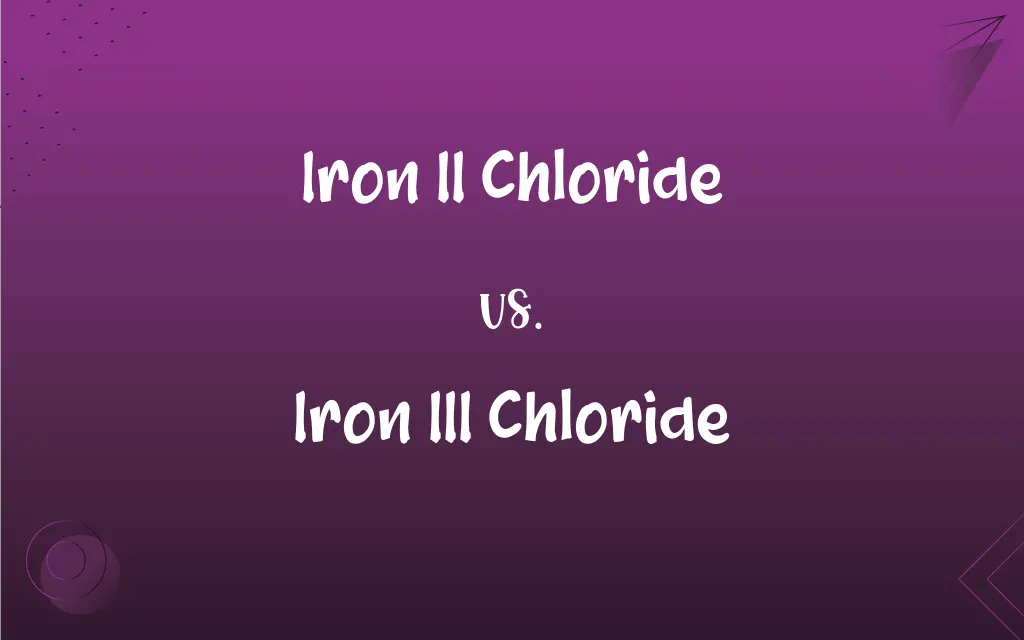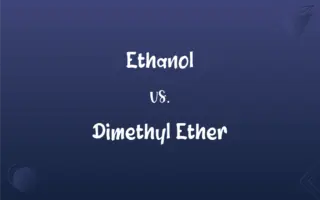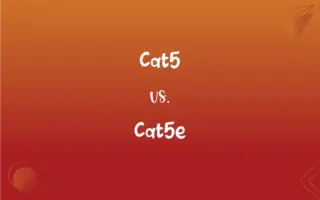Iron II Chloride vs. Iron III Chloride: What's the Difference?
Edited by Aimie Carlson || By Janet White || Published on January 10, 2024
Iron II chloride (FeCl2) is a ferrous compound with divalent iron, while Iron III chloride (FeCl3) is a ferric compound with trivalent iron.

Key Differences
Iron II chloride, also known as ferrous chloride, has the chemical formula FeCl2. It consists of iron in the +2 oxidation state. Iron III chloride, known as ferric chloride, is denoted by the formula FeCl3 and contains iron in the +3 oxidation state. These oxidation states affect their chemical reactivity and applications.
In terms of appearance, Iron II chloride typically forms greenish-white crystalline solids, whereas Iron III chloride forms dark brown crystals. This difference in color is due to the different oxidation states of iron in these compounds.
Iron II chloride is used in various applications, such as wastewater treatment, the synthesis of other iron compounds, and as a reducing agent in organic synthesis. Iron III chloride, on the other hand, is widely used in water treatment, as a catalyst in organic synthesis, and in the etching of copper in the manufacturing of printed circuit boards.
The solubility of Iron II chloride in water is high, and it readily forms hydrates. Iron III chloride also forms hydrates but can undergo hydrolysis, which affects its solubility and the pH of its solutions.
In biological systems, Iron II chloride can be important in redox reactions and is more soluble under physiological conditions than Iron III chloride. However, Iron III chloride is used in medical and laboratory settings for its coagulating properties, especially in the treatment of bleeding.
ADVERTISEMENT
Comparison Chart
Oxidation State of Iron
+2 (Ferrous)
+3 (Ferric)
Appearance
Greenish-white crystalline solid
Dark brown crystals
Common Uses
Wastewater treatment, synthesis of compounds
Water treatment, catalyst, etching PCBs
Solubility and Hydration
Highly soluble, forms hydrates
Forms hydrates, undergoes hydrolysis
Biological and Medical Use
Involved in redox reactions
Used for coagulating properties in medicine
ADVERTISEMENT
Iron II Chloride and Iron III Chloride Definitions
Iron II Chloride
Iron II chloride is a ferrous compound with divalent iron.
Iron II chloride is used to reduce hexavalent chromium in water.
Iron III Chloride
Iron III chloride is used for its coagulating properties in medicine.
FeCl3 is applied in medical settings to stop bleeding in minor injuries.
Iron II Chloride
Iron II chloride is involved in biological redox reactions.
FeCl2 plays a role in the electron transport chain in cellular metabolism.
Iron III Chloride
It appears as dark brown crystals and is used in water purification.
FeCl3 effectively coagulates impurities in water treatment processes.
Iron II Chloride
Iron II chloride serves as a reducing agent in organic synthesis.
FeCl2 was utilized as a reducing agent in the synthesis of various organic compounds.
Iron III Chloride
Iron III chloride is a ferric compound with trivalent iron.
Iron III chloride is used in the treatment of sewage water.
Iron II Chloride
It's a greenish-white solid used in wastewater treatment.
FeCl2 effectively removes heavy metals from industrial wastewater.
Iron III Chloride
It forms hydrates and can undergo hydrolysis.
The hydrolysis of Iron III chloride is utilized in the preparation of certain solutions.
Iron II Chloride
It forms highly soluble hydrates in water.
The solubility of Iron II chloride makes it useful in various aqueous solutions.
Iron III Chloride
Iron III chloride acts as a catalyst in organic reactions.
FeCl3 is commonly used in the chlorination of aromatic compounds.
FAQs
What is Iron III chloride?
A ferric compound with iron in the +3 oxidation state.
Is Iron II chloride soluble in water?
Yes, it is highly soluble and forms hydrates.
What is Iron II chloride?
A ferrous compound with iron in the +2 oxidation state.
Where is Iron II chloride commonly used?
In wastewater treatment and organic synthesis.
What are the applications of Iron III chloride?
In water treatment, as a catalyst, and in PCB etching.
Is Iron II chloride used in medicine?
Not commonly, it's more used in industrial applications.
Can Iron II chloride be used in food processing?
It is not typically used in food processing.
Are there any safety concerns with Iron II chloride?
Yes, it should be handled with care as it is a corrosive substance.
Can Iron III chloride undergo hydrolysis?
Yes, it undergoes hydrolysis, affecting its solubility and pH.
What color is Iron II chloride?
Greenish-white in its crystalline form.
What is the appearance of Iron III chloride?
It appears as dark brown crystals.
What medical use does Iron III chloride have?
It's used for its coagulating properties to treat bleeding.
Is Iron III chloride safe for environmental applications?
Yes, but it should be used carefully due to its reactivity.
How is Iron II chloride produced?
Typically by reacting iron with hydrochloric acid.
What is the role of Iron III chloride in organic reactions?
It acts as a catalyst, especially in chlorination reactions.
How is Iron III chloride synthesized?
Often by oxidizing Iron II chloride or reacting iron with chlorine.
What precautions are needed for Iron III chloride?
It requires safe handling due to its corrosive and oxidizing nature.
Can Iron II chloride be used in electronics?
It's not typically used in electronics, unlike Iron III chloride.
How does Iron II chloride act in redox reactions?
As a reducing agent, participating in electron transfer.
Is Iron III chloride used in the laboratory?
Yes, it's commonly used in chemical syntheses and experiments.
About Author
Written by
Janet WhiteJanet White has been an esteemed writer and blogger for Difference Wiki. Holding a Master's degree in Science and Medical Journalism from the prestigious Boston University, she has consistently demonstrated her expertise and passion for her field. When she's not immersed in her work, Janet relishes her time exercising, delving into a good book, and cherishing moments with friends and family.
Edited by
Aimie CarlsonAimie Carlson, holding a master's degree in English literature, is a fervent English language enthusiast. She lends her writing talents to Difference Wiki, a prominent website that specializes in comparisons, offering readers insightful analyses that both captivate and inform.






































































